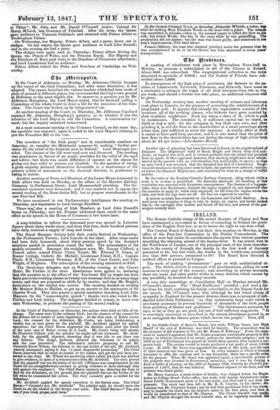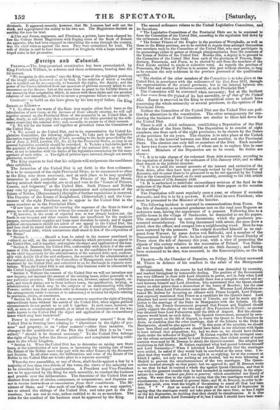IRELAND.
The Roman Catholic clergy of the united dioceses of Cloyne and Ross have commenced a movement in favour of extending to Ireland the provi- sions of the English Poor-law, so as to insure the right to ontdoor relieg The Central Board of Health had their first meeting on Monday, at tb* office of the Poor-law Commission in the Dublin Customhouse. The Board at once had under its consideration the reports from various quarters describing the alarming spread of the famine-fever. It was stated, that in the Workhouse of Lurgan, one of the principal seats of the linen manufac- ture in the county of Armagh, the deaths in the first week of January amounted to 35; but last week, the deaths in the workhouse, containing less than 800 persons, amounted to 95! The Board have directed a medical officer to proceed to Lurgan.
The work of making " presentments " goes on with undiminished vi- gour. The Dublin Gazette is crammed with proclamations, calling for new sessions in every part of the country; and, according to private accounts, there are roads and other public works in many districts which cannot by any possibility be finished for many months.
A very thin assemblage at Conciliation Hall on Monday attested Mr. O'Connell's absence. The "Head Pacificator" presided ; and read a let- ter from his chief; enclosing his family subscription to the Repeal funds for the month. Mr. O'Connell says, that although he had found plenty of sympathy in England for the present distress, there was no prospect of sub- stantial relief from Parliament, "on that enormously large scale which is absolutely necessary to prevent hundreds of thousands of the Irish people from perishing of famine and pestilence." The Government measures, he says, as far as they go, are good, but not of half sufficient magnitude. "It is essentially necessary to have food in the utmost abundance poured in, so as to extinguish the famine prices which devour the people." Rent, 27L In the Dublin Court of Queen's Bench, last week, William Grace, late High Sheriff of the city of Kilkenny, was tried for forgery. The prosecution was at the instance of the trustees of the late Mr. Evans of Kilkenny. From the state- ment of counsel it appeared, that Mr. Evans possessed considerable property in Kil- kenny; in 1818 he invested it in certain persons for charitable purposes; and in 1819 an act of Parliament was passed by which these persons were created a cor- porate body. The estates vested in trusts produced a net profit of about 1,000L a year. In 1836, Mr. Grace was appointed the agent of this body, and the care of their common seal was given to him. In every instance in which it became necessary to affix the common seal to any document, there was a specific order for the purpose. When Mr. Grace was appointed agent, a considerable portion of the property was invested in Government securities; and it was for forging a deed or letter of attorney, on the 16th of January 1843, whereby he obtained pos- session of 1,5671., that he was indicted. Witnesses deposed to the facts, and the prisoner was found guilty. Mr. Henry Lananze, a stock-broker of Dublin, was charged before the Magis- trates at College Street Police-office, last week, with having fraudulently trans- ferred 9,0001. Government stock to his own name, and then sold it and used the proceeds. The stock had been left to Mr. R. B. Clayton, by his. father; Mr. Lanauze PM Mr. Clayton's broker; and he told that gentleman that It was neces- sary to transfer the stock into the broker's name in the first place, and then it would be transferred to that of Mr. Clayton. The former transfer was made; and Mr. Clayton thought the second transfer also, as he regularly received the
dividends. It appeared recently, however, that Mr. Lanauze had sold out the stock, and appropriated the money to his own use. The Magistrates decided on sanding the case for trial.
.Aekins and James, engravers, and Fitzsimon, a printer, have been charged be- fare the College Street Magistrates with forging notes of the Bank of Ireland. An approver, who had been engaged in circulating the notes through the country, was the chief witness against the men. They were committed for trial. The wife of Atkins is said to have been arrested at Drogheda with a large number of forged notes in her poesession.



























 Previous page
Previous page